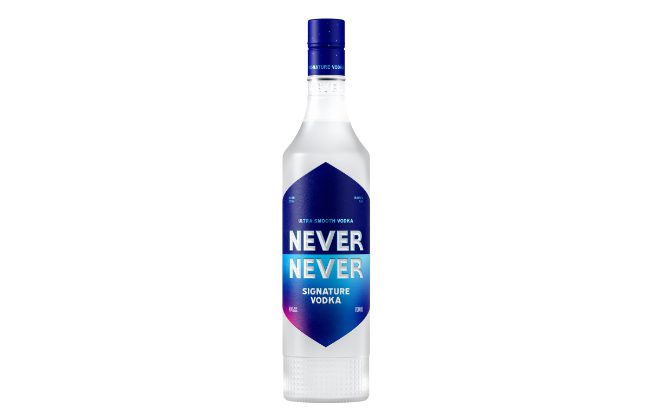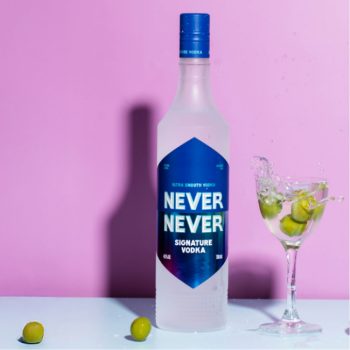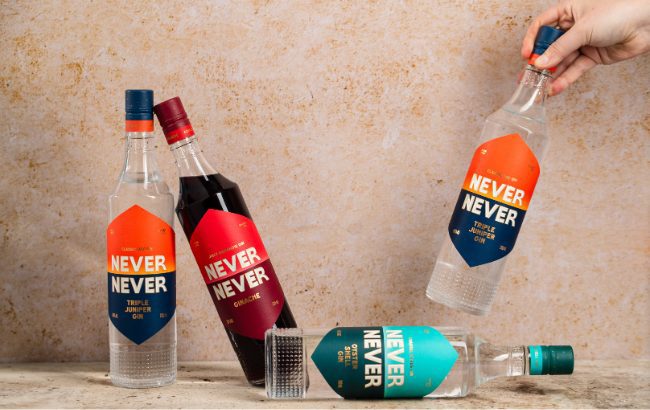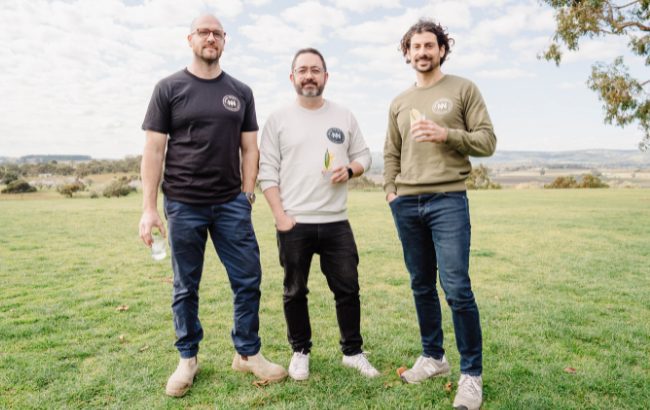Never Never Distilling on its first vodka and Asahi deal
By Rupert HohwielerThe co-founder of gin maker Never Never Distilling Co discusses the Australian firm’s first move into vodka and how Asahi’s acquisition is helping the business tap into new opportunities.

Signature Vodka was distilled from Australian wheat spirit and enriched with olive, coconut, and avocado oils. It was then filtered through activated carbon for 16 hours and blended with McLaren Vale water, before the oil distillates were blended into the final vodka composition.
Never Never uses the same water for its gin range, however for the vodka, natural salts were added to enhance mouthfeel and elevate pH.
The distillery looked to create a vodka where texture is the focus, with each oil distillate making its own unique mark on the final product: olive oil for silkiness, coconut oil for body, and avocado for balance.
With the release, the brand is taking aim at Australia’s ‘Martini obsession’. “More venues than ever are showcasing Martinis and we love it. This vodka is built to create superior Martini and cocktail experiences,” said co-founder Sean Baxter.
“Texturally we believe it’s superior to anything on the market. Try it in a classic Vesper, mixed with one of our gins.”
The vodka’s profile is said to have notes of light olive, white chocolate, honeyed macadamia and coconut cream, with balanced minerality and sea salt. It is described as having a ‘silky texture’ with a long, extended finish.
“We built a textural vodka using the techniques learned over eight years of building incredible flavour in gin, and we think it’s one of the best out there,” Baxter added. “It’s as smooth as the sultry jazz soundtrack of our favourite bars and the silky cocktails you can find in them.”

Of the packaging, the liquid is presented in a 700ml frosted bottle , which is recycled and has a colour-coded closure.
It features gradients on its back to ensure ‘easy stocktaking and batching’, the brand explained. A textured and weighted base adds efficiency for bar use.
The vodka sits at 40% ABV and has an RRP of AU$70 (US$45).
Never Never’s Signature Vodka has been shortlisted for most innovative spirit at The Spirits Business Awards 2025.
The brand’s master distiller, Tim Boast, has been nominated for Distiller of the Year.
Vodka is Australia’s biggest-selling spirit in the on-trade, according to data from CGA by NIQ.
Innovation in Australia
In a press release for the vodka, Baxter said: “Creating an authentic premium vodka is challenging in Australia. We can’t rely on Eastern European distilling heritage, Russian winter wheat or Polish potato. We don’t have Icelandic glacial water or French Appellation d’Origine Contrôlée.”
Baxter told The Spirits Business that the release is a very different reflection of the way a gin maker can make vodka. “I think that the real trick, or opportunity, was how we could influence other categories of Australia by using some of the skills that we’ve built over the last eight years, making trophy-winning gin, and implementing and innovating within the vodka category.
“I think we have done that, which is wild to think about. I didn’t think I would be capable of being excited after spending so long in the gin category, but it’s really interesting and what we’ve been able to do with the distillates that we’re adding to it, in the same way that you blend in gin, is really cool.
Baxter says he wouldn’t have been able to make a vodka of this nature in Europe: “We wouldn’t be allowed to, so the fact that we can do it in Australia is another indicator of our capacity to create innovative spirit.”
He suggests the relative freedom Australia has with spirits regulation in comparison to other countries encourages Australia’s distillers to innovate. “In the US everything is very tightly wound and regulated around what you can call your product, how you can use it and how you can age it. In Scotland, it’s very similar.
“In Australia, we don’t have a lot of that and it can sometimes ruffle feathers, but at the same time, it also does encourage innovation. That’s a wonderful thing that you can see within the Australian category.
Additionally, the wealth of natural resources Australia is home to helps as well. “We’ve got incredible raw materials and ingredients, along with the relaxed regulations around spirit definition,” he adds.
Though this is an opportunity, Australia’s location on the other side of the world to everyone else poses a challenge. “Because we’re so far away, the costs of actually exporting all these products is immense. It’s one of those reasons when you visit Australia and see the spirit category here, it’s very rich, but you don’t see a lot of it outside of Australia, because the cost of getting it outside is so big.
“To make gin in Australia everything has to come a long way to get to us, especially if you’re building classic gin styles where you’re importing things like juniper,” Baxter continues. “For instance ours comes from the Republic of North Macedonia. Those costs are not cheap. It’s the same for glass, closures and all of the various bits and pieces that go into manufacturing a product – all, especially at scale, are imported. And if you want to make an impact from an export perspective, it’s a long way to ship it back.”

Signature Vodka arrives after eight years of gin innovation for Never Never, which is located in McLaren Vale, South Australia. Since its founding in 2016, the distillery has followed its flagship Triple Juniper Gin with variants like Oyster Shell and Ginache.
Recalling how the team came up with the idea of Triple Juniper, Baxter says it was built off the back of London Dry’s popularity in Australia. “Most people here come to understand gin through slightly more attractive price point-driven gins on the shelf that you find within the lower category of the market. A lot of these are replications of a pretty standard London Dry. Contemporary gin is still pretty new in the market.”
“Four Pillars was first to market and even then, that wasn’t a gin that was driven by a native botanical style so much. It had its own Australian flair, but it certainly wasn’t an achingly Australian native gin style.”
In terms of catering for an audience, he says the brand only started working contemporary gin styles in 2020 where they were getting immediate feedback on releases (like Ginache, a gin made with McLaren Vale Grenache grapes). “Up until that point, Triple Juniper, Southern Strength… they were all very similar, or in fact exactly the same botanical mix, except for different ratios.
“In 2020, we had so many other customers coming up to the distillery and we didn’t really have anything to show them. That’s where we started to explore this idea of contemporary gin slightly more, and it gave us a real point of difference in the market.”
The fruit gin category in Australia is rich with grapes, which has led to one of Never Never’s most popular variants, Ginache, made with Grenache grapes.
He says these types of gin are similar to how one would make sloe gin. “The grapes are harvested, de-stemmed, crushed, and then over-proof gin [Triple Juniper] is added to it to draw out flavour and character.”
Ginache is one of Never Never highest-selling gins at its distillery, Baxter says: “People drive through all these incredible vines of a Grenache fruit on their way here, so when they get to the site they’re keen to try this grape gin that we built.”
On the Oyster Shell gin, this came from a collaboration with the Sydney Restaurant Society, who wanted a gin for Martinis. “We just went really hard at savoury and it’s absolutely stunning,” Baxter says.
“I did not think that would take off and it’s not gonna appeal to everybody, but I didn’t take into account that passionate oyster lovers would support the gin. It taught me a lot about our business and was our first foray into contemporary, and that’s our number two gin. Triple Juniper is always going to be our number one, but a huge driver of our growth was ‘the shell’.
Asahi acquisition
In May last year, Never Never’s business would change for good when it was purchased by Asahi Beverages, the Australian and New Zealand arm of Japanese conglomerate Asahi Group.
As a small brand, Baxter says the opportunity has been “pretty massive”. He called it “one of those rare opportunities where a small brand gets to actually use the backing of such a fantastic partner to amplify and grow their business”.
He says getting picked up by a major company was an ambition the team shared from the early days. “We weren’t a mum-and-dad sort of distilling group.
“Tim, George [George Georgiadis and Tim Boast, Never Never’s co-founders] and I always had ambitions of being able to grow the business to a point which would make it attractive enough for an acquisition. That was certainly always the case, but we didn’t think Asahi would come knocking.”
Baxter says Australia is right in the middle of a spirits recession. “It’s probably a bit dramatic to say it like that”, he adds, lightening the tone, but domestic spirits are in a difficult spot.
Regarding gin, Never Never’s cellar door business [distillery and tasting room, which includes Chalk Hill Wines and Cucina Di Strada] gave the brand more of an opportunity to invest in things like marketing. Baxter contends that without this in the Australian category “you’re reliant on your retail bottle sales and your presence within the on-trade here, and you’re doing it much tougher.”
For Never Never, Baxter has seen both sides of it. “A couple of years ago, we were making people redundant and then during last year, we went from 10 full-time workers to 30. Now we’re building our business in South Australia with South Australians jumping to the actual business of growing it.
“So maybe it’s a bit of a false dawn for the gin category here just because we’re in growth and continuing to see growth off the back of the levers we’re able to pull, but we’re certainly not reflective of the category at full.”

The backing of Asahi has allowed the brand to address issues it would not have been able to otherwise, such as the transition to a 700ml bottle from a 500ml format at the end of June.
“Early doors we always thought 500ml was going to be the best for us for growth, meaning that we had a more approachable price, could grow faster and distribute a product wider,” he says. “But after eight years, we were at that point where we were kind of ready to make that next move up.
“I don’t think we would have been able to do that without the Asahi partnership as it was a pretty expensive exercise.”
Baxter says he and the team had been working on the format transition for three years before the Asahi purchase. “I think the actual foresight, planning and hard work that we’d put in to show that during that transaction period certainly put us in a really good place, because Asahi understood that we knew some of the issues with our bottle, label and our storytelling component – and that needed to be refreshed. Obviously, that’s not available to everybody.”
It’s early days still in the partnership, but Baxter believes the signs are very positive. “We’re still having to pull through a lot of old stock at retailers, but it’s allowed us to bring our net price down, become a little bit more competitive on shelf and all those things in an Australian economy where there’s a lot of price point pressure and a lot of customers seeking value. It’s given us a real shot in the arm.”
Having just dropped its first vodka, Baxter says the brand will be trying to maintain the momentum. “There’s a lot of opportunity with a business like Asahi to work with their pre-existing partnerships and relationships across the country. We’re doing our best to make sure that we’re able to build products that are able to fit in the substream of those opportunities, things like RTDs, working with collaborative partners when it comes to building out opportunities.
“Realistically – like the 700ml transition we went through – the biggest opportunity for us is to continue to support those opportunities of market that we see. Asahi obviously has such an incredible footprint around the country in terms of already having an active sales force.
“These are things we’d never have been able to work with prior, so I think the new bottle size and being able to bring our net price down in a period where everyone’s seeking value, is an incredible opportunity for us to grow.
“Those are the things we’re really focusing on at the moment because they offer us the best chance of being able to build a business.”
Related news
Australian distillers form Spirits NSW group
